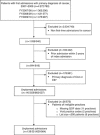Association between patient and general practice characteristics and unplanned first-time admissions for cancer: observational study
- PMID: 22828606
- PMCID: PMC3494442
- DOI: 10.1038/bjc.2012.320
Association between patient and general practice characteristics and unplanned first-time admissions for cancer: observational study
Abstract
Background: To identify patient and general practice (GP) characteristics associated with emergency (unplanned) first admissions for cancer in secondary care.
Methods: Patients who had a first-time admission with a primary diagnosis of cancer during 2007/08 to 2009/10 were identified from administrative hospital data. We modelled the associations between the odds of these admissions being unplanned and various patient and GP practice characteristics using national data sets, including the Quality and Outcomes Framework (QOF).
Results: There were 639,064 patients with a first-time admission for cancer, with 139,351 unplanned, from 7957 GP practices. The unplanned proportion ranged from 13.9% (patients aged 15-44 years) to 44.9% (patients aged 85 years and older, P<0.0001), with large variation by ethnicity (highest in Asians), deprivation, rurality and cancer type. In unadjusted analyses, all included patient and practice-level variables were statistically significant predictors of the admissions being unplanned. After adjustment, patient area-level deprivation was a key factor (most deprived compared with least deprived quintile OR 1.36, 95% CI 1.32-1.40). Higher total QOF performance protected against unplanned admission (OR 0.94 per 100 points; 95% CI 0.91-0.97); having no GPs with a UK primary medical qualification (OR 1.08, 95% CI 1.04-1.11) and being less able to offer appointments within 48 h were associated with higher odds.
Conclusion: We have identified some patient and practice characteristics associated with a first-time admission for cancer being unplanned. The former could be used to help identify patients at high risk, while the latter raise questions about the role of practice organisation and staff training.
Conflict of interest statement
The Dr Foster Unit at Imperial is principally funded through a research grant by Dr Foster Intelligence, an independent healthcare information company and joint venture with the Information Centre of the NHS. The Dr Foster Unit at Imperial is affiliated with the Imperial Centre for Patient Safety and Service Quality at Imperial College Healthcare NHS Trust, which is funded by the National Institute of Health Research.
The funders had no role in the design, analysis, write-up or decision to submit for publication.
We hold Section 251 (formerly Section 60) National Information Governance Board for Health and Social Care permission to hold these data for research purposes. We hold South East Local Research Ethics Committee approval to analyse the data.
Comment in
-
Emergency admissions of cancer as a marker of diagnostic delay.Br J Cancer. 2012 Oct 9;107(8):1205-6. doi: 10.1038/bjc.2012.423. Br J Cancer. 2012. PMID: 23047590 Free PMC article. No abstract available.
References
-
- Ashworth M, Millett C (2008) Quality improvement in UK primary care: the role of financial incentives. J Ambulatory Care Manage 31: 220–225 - PubMed
-
- Ashworth M, Schofield P, Seed P, Durbaba S, Kordowicz M, Jones R (2011) Identifying poorly performing general practices in England: a longitudinal study using data from the quality and outcomes framework. J Health Serv Res Policy 16: 21–27 - PubMed
-
- Berrino F, Gatta G, Sant M, Capocaccia R (2001) The EUROCARE study of survival of cancer patients in Europe: aims, current status, strengths and weaknesses. Eur J Cancer 37: 673–677 - PubMed


